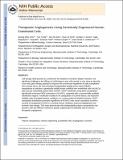Therapeutic angiogenesis using genetically engineered human endothelial cells
Author(s)
Cho, Seung-Woo; Son, Sun Mi; Park, Hyun-Ji; Green, Jordan J.; Bogatyrev, Said; Mei, Ying; Park, Sohyun; Anderson, Daniel Griffith; Langer, Robert S; Yang, Fan; ... Show more Show less
DownloadAnderson_Theraputic angiogenesis.pdf (1.830Mb)
PUBLISHER_CC
Publisher with Creative Commons License
Creative Commons Attribution
Terms of use
Metadata
Show full item recordAbstract
Cell therapy holds promise as a method for the treatment of ischemic disease. However, one significant challenge to the efficacy of cell therapy is poor cell survival in vivo. Here we describe a non-viral, gene therapy approach to improve the survival and engraftment of cells transplanted into ischemic tissue. We have developed biodegradable poly(β-amino esters) (PBAE) nanoparticles as vehicles to genetically modify human umbilical vein endothelial cells (HUVECs) with vascular endothelial growth factor (VEGF). VEGF transfection using these nanoparticles significantly enhanced VEGF expression in HUVECs, compared with a commercially-available transfection reagent. Transfection resulted in the upregulation of survival factors, and improved viability under simulated ischemic conditions. In a mouse model of hindlimb ischemia, VEGF nanoparticle transfection promoted engraftment of HUVECs into mouse vasculature as well as survival of transplanted HUVECs in ischemic tissues, leading to improved angiogenesis and ischemic limb salvage. This study demonstrates that biodegradable polymer nanoparticles may provide a safe and effective method for genetic engineering of endothelial cells to enhance therapeutic angiogenesis.
Date issued
2012-03Department
Harvard University--MIT Division of Health Sciences and Technology; Massachusetts Institute of Technology. Department of Biology; Massachusetts Institute of Technology. Department of Chemical Engineering; Koch Institute for Integrative Cancer Research at MITJournal
Journal of Controlled Release
Publisher
Elsevier
Citation
Cho, Seung-Woo, Fan Yang, Sun Mi Son, Hyun-Ji Park, Jordan J. Green, Said Bogatyrev, Ying Mei, Sohyun Park, Robert Langer, and Daniel G. Anderson. “Therapeutic Angiogenesis Using Genetically Engineered Human Endothelial Cells.” Journal of Controlled Release 160, no. 3 (June 2012): 515–524.
Version: Author's final manuscript
ISSN
01683659